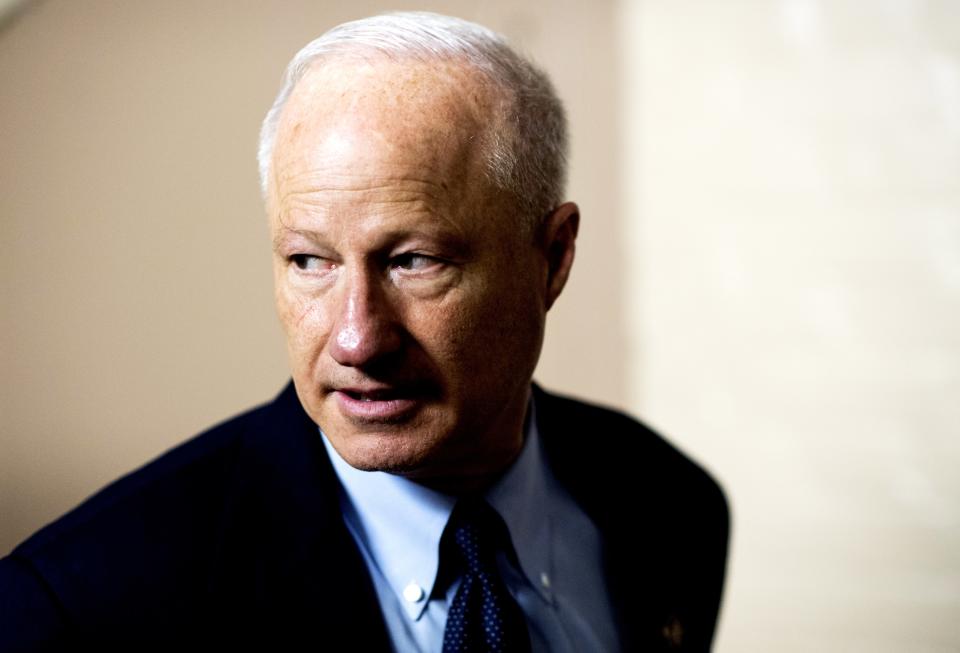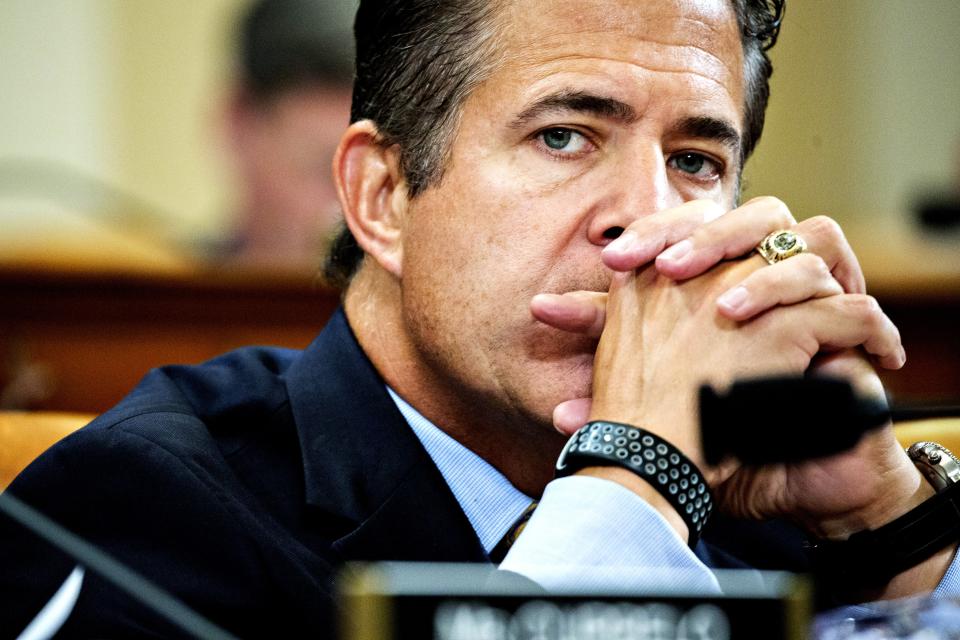How the Democrats Can Flip the House in the 2018 Midterm Elections, Part 5
Over the ten weeks between Labor Day and Election Day, as Democrats and Republicans battle it out for control of the House, we're taking a look at 30 of the most competitive races in the 2018 midterm elections: Where are these key districts, and what are they like? Which member is trying to keep their job? Who wants to take it away? And for whom might generous donations of your valuable time and money make the greatest difference, if you were so inclined to make them? Democrats need to win only 23 seats to earn the gavel for the next two years, and nothing terrifies Donald Trump and friends more than what they plan to do with it.
You can read earlier installments of this series at the end of this post, and a complete guide to the 2018 Senate races here.
Colorado 6th: A bellwether district in the Denver suburbs

Rep. Mike Coffman
Bill Clark/Getty ImagesThe district: Centennial, Highlands Ranch, and the suburbs that ring the eastern side of Denver. Clinton beat Trump here by an astonishing nine points in 2016, and it went for Obama twice before that. It's growing quickly and loaded with independents, and about 16 percent of residents were born outside the United States.
The incumbent: Republican Mike Coffman, who contains multitudes, which is a polite way of saying that he knows his district has left him behind, and he's open to saying whatever might yield him another two years in office. He was for the tax bill but against Obamacare repeal; he ran an ad promising to "stand up" to Trump in 2016 but has spent the past two years voting for a ton of Trump's pet policies; he made a big show of opposing the Muslim ban and family separations but also said that he supports a "transition" to a zero-tolerance immigration policy. What do you look for in a congressman? Mike Coffman is happy to be it.
The challenger: Jason Crow, a former Army Ranger turned law-firm partner who takes a great marketing headshot. The way he got here was a little sketchy—in April, The Intercept published a secret recording of House minority whip Steny Hoyer urging Crow's primary opponent to drop out, which is both a bad look and also, given the Democratic Party's recent track record of picking congressional candidates, not necessarily great advice. Perhaps coincidentally, perhaps not, Crow has since declared that if elected, he wouldn't support a Pelosi speakership bid. He's made gun control a central issue—Aurora, the site of a 2012 movie-theater shooting, is the largest city in the district.
Holy crap: A September New York Times poll had Crow up 11 points, but good Lord, so much money has yet to be spent here. In 2016, the candidates and outside groups blew through close to $20 million, making it the fifth most expensive House race in the country. Since this is one of those contests that everyone seems to think will predict control of Congress, expect this year's figure to eclipse that. By Election Day, these people won't be able to go outside without being urged to vote for a white guy whose last name starts with C.
Michigan 8th: An ex–Obama official vies to head back to Washington

House Ways And Means Committee Holds A Markup Of The Tax Cuts And Jobs Act
BloombergThe district: A stretch of counties along I-96 between Lansing and the Detroit suburbs. It went for Obama in 2008, Romney in 2012, and then Trump in 2016. Michigan State University, an otherwise unobjectionable institution of higher education that was helmed for decades by a horrific cabal of abuser-enabling monsters who should all be fired at best and jailed at worst, is located here.
The incumbent: Mike Bishop, a longtime state legislator who is wrapping up his second term in Congress. As a member of the Ways & Means Committee, he was one of the drafters of the Republican tax-reform bill. He is also a lifelong Oakland County resident, and his website is unnervingly invested in making sure you know it.
Mike Bishop and his family have lived in the 8th district their whole lives. Mike is our neighbor who has served our community with honor and dignity. Mike Bishop enjoys serving the 8th District because it is his home where he has always lived. Mike Bishop has never bought a house in Washington because his home is here. While Mike REPRESENTS the people of the 8th District in Washington, HIS HOME is IN MICHIGAN and always will be IN MICHIGAN. Congressman Bishop lives to serve his neighbors, friends and family.
Why the performative provincialism, you ask?
The challenger: Elissa Slotkin, a former CIA analyst and Obama-era Pentagon official who moved back home to Michigan after 2016 and launched her bid for Congress shortly thereafter. Her platform is heavy on national security– and military-related issues, but it's pretty robust across the board, especially compared to Bishop's, which consists mostly of vagaries and, again, urgent reminders about where he lives.
C.R.E.A.M.: Despite a pledge not to take corporate PAC dollars, Slotkin has been smoking Bishop on the fundraising circuit, outpacing him by nearly a million dollars as of mid-July. Representatives of the Congressional Leadership Fund, the super-PAC affiliated with Paul Ryan, are not happy about it. From The Detroit News:
[CLF executive director Corry] Bliss says incumbents getting outraised by Democratic challengers is "inexcusable."
“If you’re an incumbent member of Congress and getting outraised, you should either work harder or spend time working on your résumé," he said.
“I think if you’re being outraised, it’s largely just work ethic. I find it very hard to believe this many Republican incumbents were spending 15 hours a week doing all the grunt work to raise money and getting outraised.”
Yikes. CLF has set aside at least $2.2 million for this race, though, which means that even though the single most important skill in American politics is one of Bishop's glaring weaknesses, Slotkin should still have her hands full as November approaches.
Kansas 3rd: Sharice Davids could make history

U.S. Congressman, Kevin Yoder, (R) Kansas 3rd district speaking with constituents.
The Washington PostThe district: Kansas City—the little one, not the big one—and its suburbs. The district is very white and sports some very weird voting patterns: Romney blew out Obama in 2012, but Hillary edged Trump by 1.2 points in 2016.
The incumbent: Kevin Yoder, first elected to the House in the Tea Party midterms at age 34. You may remember him as the guy who had to apologize for skinny-dipping in the Sea of Galilee on a congressional trip to Israel in 2011. He received an admonishment from then House majority leader Eric Cantor, and the FBI apparently looked into the incident, but since making poor decisions is not a federal crime, they closed their investigation without any findings of wrongdoing. As chair of the House Appropriations Committee's subcommittee on national security, he is well positioned to champion the border wall that will never get built, which makes him a favorite of you-know-who.
The challenger: Thirty-eight-year-old attorney Sharice Davids, who is Native American, openly gay, and a former professional MMA fighter. She won a very competitive primary, and her ad will make you want to punch a hole in something for DEMOCRACY.
Davids raised a ton of money from small-dollar donations, and if she wins, she'll become one of the first two Native American women ever to serve in the United States Congress. (Deb Haaland is running for a safe Democratic seat in New Mexico.)
We all know what you mean, Kevin: Just before the Democratic primary, when it remained unclear whether Davids or her chief rival, Brent Welder, would triumph, Yoder warned a crowd of his supporters that "neither of them are from here, and both want to force their radical ideas on those of us who have dedicated our entire lives to this community and this state." Then, placing the dog whistle gently to his mouth and blowing as hard as he could, he continued: "They don’t know Kansas, they don’t know our values, and neither of them should be our voice in Washington, D.C."
The "our values" reference incensed the Kansas City Star editorial board, which lambasted Yoder's "minute-to-minute malleability" as a politician and proceeded to deliver a line-by-line fisking of his comments.
As a Native American, oh yes, Davids is very much from here. As a graduate of Leavenworth High, where she lived until her single mom retired from the Army there, and of Johnson County Community College, yes, she is from around here.
As someone who graduated from Cornell Law, was in private practice, worked on Pine Ridge Indian Reservation in South Dakota and then was a White House fellow, she could have gone anywhere but chose to come back to Kansas. So yes, she is from around here.
What is it with these Republican incumbents and the robotic insistence that only those people who have paid rent in one congressional district for their entire lives should be serving in Congress?
He could not have been knocking the work ethic of a woman who worked her way through college and law school, or the discipline of a former mixed martial arts fighter.
We hope he wasn’t talking about the fact that she’d be the first Native American woman elected to Congress and the first openly LGBT person to represent Kansas.
Sure seems like he might have been!
Previously in "A House-Flipper's Guide to the 2018 Midterm Elections":
Part 1: Illinois 6th, California 10th, Maine 2nd
Part 2: New York 19th, Kansas 2nd, California 25th
Part 3: Kentucky 6th, California 39th, Ohio 1st
Part 4: Iowa 1st, Virginia 7th, Washington 8th


